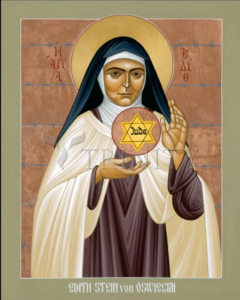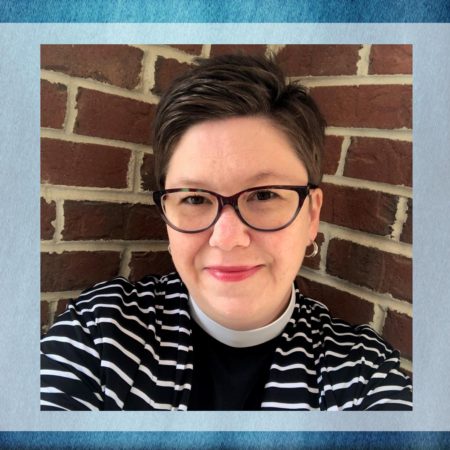 From the Rector
From the Rector
A saint to illuminate our path
 Yesterday was the feast day of German philosopher and Carmelite nun Edith Klein. During the monthly diocesan Zoom meeting with clergy and wardens, Bishop-elect Carrie offered a thoughtful reflection on Edith’s life and work. She’s a new addition to our calendar of holy women and men, but in hearing and then reading more about her it’s clear as to why we hold her up as a saint.
Yesterday was the feast day of German philosopher and Carmelite nun Edith Klein. During the monthly diocesan Zoom meeting with clergy and wardens, Bishop-elect Carrie offered a thoughtful reflection on Edith’s life and work. She’s a new addition to our calendar of holy women and men, but in hearing and then reading more about her it’s clear as to why we hold her up as a saint.
What do we mean by the word saint? To be clear, our understanding in the Episcopal Church is different than that of the Roman Catholic Church and other denominations. At its most basic, we define saints as holy people who share in the life of Christ. When we talk about the Communion of Saints, we mean all those who have come before us in the life of faith. Saints can also refer to specific people whose lives have magnified God in particular ways, people who have illuminated a path of faithfulness for others to follow.
Such is the case for Edith, who was born in 1891 to an observant Jewish family but was an atheist by her early teens. As a young woman her studies in philosophy were interrupted by the outbreak of World War I. During the war she served as a volunteer Red Cross nurse, and afterward she completed her studies and graduated summa cum laude with a doctorate.
A brilliant thinker, it was from reading the works of the reformer of the Carmelite Order, Terese of Avila, that Edith was drawn to the Roman Catholic faith. She was baptized in 1922 and in 1932 joined the Carmelite monastery in Cologne. In 1938 Edith was sent to a Carmelite monastery in the Netherlands out of concerns for her safety as the Nazis rose to power in Germany.
Ultimately even that distance wasn’t safe. When the Dutch Bishop’s conference read a public statement in all the churches of the nation in July 1942 condemning Nazi racism, in retaliation the Reichskommissar of the Netherlands ordered the arrest of all Jewish converts who had previously been spared. Edith was arrested by the SS on August 2, 1942, and deported to Auschwitz. It is believed that on August 9 she was among those murdered en masse in a gas chamber.
During her life Edith was a prolific writer, as you might expect for a philosopher, with her later writings being grounded in her Christian faith. In her reflection yesterday, Bishop-elect Carrie shared one quote in particular that illuminates the path of faithfulness beautifully: Do not accept anything as true that lacks love.
So often the conversations I have with people involve variations on the theme of how to practice their faith in their daily lives. Do not accept anything as true that lacks love is a guiding statement I will now add to not only those conversations, but my own approach to the world. It falls into the same category as Presiding Bishop Curry’s proclamation that if it’s not about love, it’s not about God – and the exhortation from Matthew’s gospel that we will be known by our fruits. Do not accept anything as true that lacks love is a measuring stick we can use as we navigate the world around us and how we embody our faith.
I invite you to pray with me the Collect for Edith Stein ~
Pour out your grace upon thy church, O God, that, like your servant Edith Stein, we may always seek what is true, defend what is right, reprove what is evil, and forgive those who sin against us, even as your Son commanded; through the same Jesus Christ our Lord, to whom with you and the Holy Spirit be all honor and glory, now and forever. Amen.
Yours in God’s peace,
Kristin+


